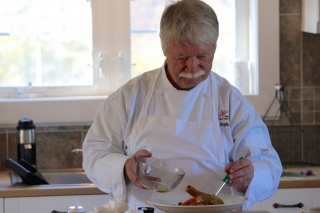
Viewing Students’ Education Differently
06 May 2024Engage students rather than focusing on content volume in culinary education.
By Paul Sorgule, MS, AAC
Feedback & comments: This email address is being protected from spambots. You need JavaScript enabled to view it.
The discussion is endless. Chefs, operators, managers and faculty members sing the same song, “Young people are not like they used to be.” Perhaps they are more specific, “Our students don’t want to put in the effort, don’t seem to care, lack the passion, or refuse to perform at an acceptable level.” Could this really be true?
There is no question that young people are different and their motivation comes from other places. Our parents’ generation said the same about us. Each generation is different, but the ever-changing environment around this cohort amplifies the contrast. The Baby Boomer and Millennial generations were not enveloped by the same level of technology, artificial intelligence, environmental crisis and sociopolitical change that American youth face today. We weren’t inundated by social media and questions about truth. We grew up slower and were required to work harder to access knowledge and information. So, yes, today’s youth are different.
At the same time, we (Baby Boomers and Millennials) are subtly trying to hang on to the way things were done a generation or two ago. Some of us teach and learn as we did in the past and respond to the challenges of the workforce and marketplace in the same manner as 50 years ago. Unsurprisingly, it doesn’t work. We must look at today’s students in a new way.
Gen X students use their energy in shorter spurts and at different targets, meaning educators may struggle to keep their attention. They also have other priorities beyond foodservice, the field we love. This does not mean students are unteachable or uninterested in the culinary business. It means our current methods and measurements do not always reach them.
The idea that we are right and they are wrong is widespread in the industry. Are we part of the problem?
Education has always been delivered on the provider’s terms. We ask students to put their lives on hold and dedicate two to four years to receiving an education. We demand they respond to our teaching by learning and demonstrating our values and projecting our desired image. We measure everyone in the same way based on the information and skills we determine to be “important.”
Put yourself a student’s shoes and think about what we are asking. Is this the most effective way to teach?
Albert Einstein once wrote, “The value of a college education is not learning many facts, but the training of the mind to think.”
Educators who inspire, draw students in and make a difference in preparing students for a productive career and life, are the ones who are less concerned with the retention of facts, figures and data. Instead, they focus on helping a student learn how to think, decipher information, research alternative methods and become self-aware. In the kitchen, the goal should not be memorizing a recipe, but learning to respect ingredients and apply cooking methods.
As we begin to think about next year, let’s set the stage for discussions about how we teach, what it means to be a teacher, and how we can better listen to our students. Let’s learn to engage them rather than focusing on the volume of content in culinary education.
PLAN BETTER – TRAIN and TEACH HARDER – LISTEN MORE INTENTLY
Paul Sorgule, MS, AAC, president of Harvest America Ventures, a mobile restaurant incubator based in Saranac Lake, N.Y., is the former vice president of New England Culinary Institute and a former dean at Paul Smith’s College. Contact him at This email address is being protected from spambots. You need JavaScript enabled to view it..
